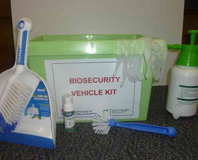Read the latest information on
Foot-and-mouth disease
 A vehicle biosecurity kit is a simple and useful tool to help limit the spread of unwanted weed seeds, pests and diseases on-farm or between farms. A kit should be carried and used by anyone working on-farm such as consultants, agronomists and farm staff, including itinerant workers and contractors.
A vehicle biosecurity kit is a simple and useful tool to help limit the spread of unwanted weed seeds, pests and diseases on-farm or between farms. A kit should be carried and used by anyone working on-farm such as consultants, agronomists and farm staff, including itinerant workers and contractors.
Although the contents of a biosecurity kit can vary from farm to farm, the basic components of all kits should include items for cleaning hands, shoes, small equipment (eg secateurs) and vehicle interiors, such as:
In addition, you could include vials or small containers, paper bags, or resealable plastic bags for collecting samples of unusual pests and plant material for further examination and identification. You may also wish to keep fact sheets on high priority exotic pests for your crops or livestock diseases as a ready reference. And always be sure to keep contact numbers for reporting unusual plant pests and emergency animal diseases handy:
Additional suggested items include:
A kit need not be expensive, and all of the items are usually available from a local hardware store. The idea is to keep your hands, clothing and small equipment clean from anything that can cause or spread weeds, pests or diseases.
Vehicle movement should also be minimised between properties to minimise the spread of soil borne diseases and weed seeds. Try to stay on formed roads and, if possible, have a vehicle that is only used on-farm. If visitors need access to parts of your property, leave their vehicle at the designated parking area, well away from crops and livestock, and take them where they need to go in the farm vehicle. That way, you will only have to deal with the weeds and potential diseases on your farm, and not those brought in from elsewhere. Visitors can also be sure that they are not taking anything off the farm.
Credit: Parts of this article are from a fact sheet by Louise Rossiter, Grains Biosecurity Officer, NSW Department of Trade and Investment, Regional Infrastructure and Services